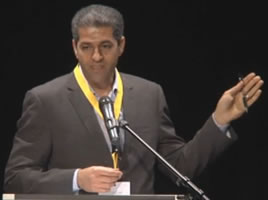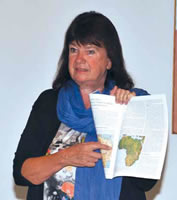Press Release
Schiller Institute Presents
Development Perspective
in Iran Conference
by Hussein Askary
March 2013
 Hussein Askary at the Schiller Institute New Paradigm Conference in Germany, November 2012.
|
 EIRNS/Christopher Lewis
Helga Zepp-LaRouche at a conference in Frankfurt in June, 2012.
|
STOCKHOLM, March 17—Hussein Askary, representing the international Schiller Institute and the Swedish Labour Party and LaRouche Movement - EAP, participated in an international conference in the Iranian city of Bandar Abbas in March 4-7 and presented the Schiller Institute's ideas for a New Paradigm. A paper by Helga Zepp-LaRouche, titled Double Standards in International Politics: Why Only a Paradigm Shift Can Save Civilization, was also presented to the conference organizers and printed in the proceedings, although she could not participate in person.
The conference, the 21st International Conference on the Persian Gulf, titled, The World in Transition: Geopolitical Development in the Islamic World & the Persian Gulf, was organized by the Institute for Political and International Studies (IPIS) and the Hormozgan Province's Governor-Generalship. This conference was held previously in Tehran, the capital, but this one was held in Bandar Abbas, just a glance away from Strait of Hormoz, to underscore the strategic and economic importance of the Gulf and this province for world peace and economic cooperation. Hormozgan, which is called the capital city of Iran in transportation, because it enjoys sea, land, and air contact with other parts of the world, has developed from being an isolated corner to a focal point for world trade, since the completion of the Mashhad-Bafq-Bandar Abbas double-track electrified railway in 1998, connecting the Gulf to Central Asia and the Caucasus.
The opening session was addressed by the First Vice President of Iran Mohammad-Reza Rahimi and the Governor General of Hormozgan Ibrahim Azizi. A message was sent to the conference by the Foreign Minister, Ali Akbar Salehi, and was read by the Director General of the IPIS Dr. Mostafa Dolatyar.
Papers were presented to the conference by academicians from a dozen countries, including the U.S. (although none could travel to Iran), Germany, Russia, Britain, several South American countries, Japan, India, and some Arab countries. The conference was dominated by the discussion of the so-called Arab Spring and its impact on international geopolitics and the Gulf, with the war in Syria and the threat of sectarian and religious wars taking center stage. Iranian officials repeated Iran's official policy as being to work with the neighboring countries on economic and cultural cooperation, and avoiding reciprocal interference in internal affairs. The U.S. and Britain received a great share of criticism for pitting the countries in the region against each other and creating an atmosphere of instability and potential regional and even global conflicts.
Hussein Askary addressed the conference on the second day, and with his presentation of the fight waged by the LaRouche movement and the Schiller Institute in the U.S. and Europe to stop British geopolitics and presenting an alternative for all nations, the atmosphere started to change. Askary began by bringing greetings from Mrs. Zepp-LaRouche and identifying her work expressed in the two most recent Schiller Institute international conferences that were held in Flörsheim and New York City. But he shocked the audience by first presenting the cosmic threats to Earth and the entire human race (taking up the meteorite blast over Chelyabinsk in Russia just two weeks earlier), reducing all talk of geopolitics and other small-minded chatter to nonsense. With the SDE presented as the forum for cooperation among nations in outer space to face the galactic threat, and the projects to green the deserts as a gathering point for nations on the surface of Earth, a new kind of discussion suddenly dominated the conference, with representatives from Asia especially coming forward with ideas for economic cooperation.
The Governor of Hormozgan attended the final session of the conference, and Askary was given a chance by the moderator to present the Schiller Institute ideas once again, pointing to Bandar Abbas on the Schiller Institute map of the World Landbridge as a link between Asia and Africa, and suggesting that the Strait of Hormoz become a launching pad for global cooperation rather than global war.
A more complete report will be forthcoming, including interviews.
